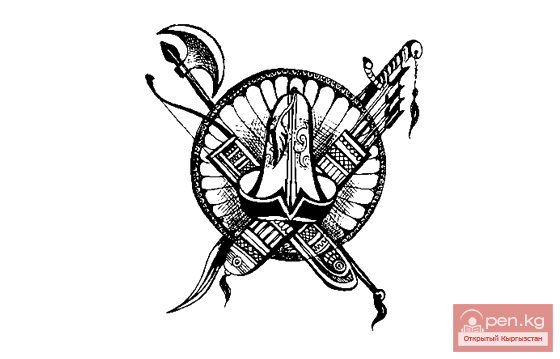
“The Tale of Manas”
— an original work by contemporary bilingual writer Mara Baidzhiev. Formally, it represents a poetic rendition of the first part of the trilogy of the Kyrgyz national epic “Manas,” “Semetey,” “Seitek.” The tale is based on the versions of outstanding folk storytellers-manaschi Sagynbai Orozbakov, Sayakbay Karalaev, Bagysh Sazanov, and Shaabay Azizov.FROM THE AUTHOR
Fulfilled the duty, bequeathed from God…
A. S. Pushkin “Boris Godunov”
One and a half centuries have passed since Russian scholars Chokan Valikhanov and V. V. Radlov informed the world that the “wild-stone” Kyrgyz, who roamed the foothills of the Tien Shan, possess the greatest oral-poetic masterpiece — the heroic epic “Manas.” Episodes of the Kyrgyz tale have been recorded, published, and translated into Russian and German.
Many scientific works have been written about the trilogy “Manas,” “Semetey,” “Seitek,” scientific conferences have been held, and in 1993, the 1000th anniversary of the epic was celebrated at a global level.
Years have passed, but our valiant hero has not reached the broad masses of the people; few know the content of the epic itself, not only abroad but also in the homeland of Manas. The reason, apparently, lies in the fact that the text of “Manas” is very voluminous and multi-variant. Translating it into verse is unmanageable, while in prose rendition, “Manas” loses half of its artistic merits. Imagine a ruby without a cut! It is one thing to listen to a manaschi storyteller while lying on one’s side and admiring nature, and another to read all of this oneself. But the main reason, perhaps, is that until now, whether in prose or verse, translations have not conveyed the artistic content of the epic but rather its performance in the interpretation of a particular storyteller. This is akin to translating not the drama of W. Shakespeare but its staging on stage, or, say, not the novel of A. S. Pushkin but the opera of P. I. Tchaikovsky “Eugene Onegin.”
So, like the storytellers of “Manas,” I had a vision…
I went to visit my Manas and saw: he had come out of a felt yurt and, in all his battle glory, was prancing on his white steed in a closed circle of the pen. People stood around, admiring the greatness of the Kyrgyz hero. And the guide enthusiastically spoke of his glory and past feats. But Manas himself was already gray, and Ak-Kul had dark markings around his eyes. I tried to open the gates of the pen, but alas, I lacked the strength. And I, as always, called upon my faithful and mighty friend — the Great Russian language and sat down to translate, or rather to poetically adapt “Manas.”
Historians have proven that the events of the tale took place in the Middle Ages of our era, so it was necessary to abandon fantasy and fairy-tale hyperbole, as well as religious and other layers of pan-Turkism and pan-Islamism introduced by storytellers after the tragic events of 1916, when the Kyrgyz people, caught between two great powers: Russia and China, suffered a brutal genocide.
In 1856, Ch. Valikhanov called the epic “Manas” the steppe “Iliad.” I consider the epic “Manas” to be the Bible of mountains and steppes, and therefore I sought to preserve biblical motifs, clarify and generalize the parable-like thoughts of the Great tale. To the best of my abilities, I aimed to preserve the canonical plot of the epic, build the logic of the characters' behavior and the development of events, and convey the vivid color of the Kyrgyz language.
The first, so to speak, trial edition of my “Tale of Manas” was published in 2009 in a small print run and immediately went to the people. The Ministry of Science and Education recommended the book as an additional textbook on the epic “Manas.” In the Russian Academic Theater named after Ch. Aitmatov, a literary-dramatic production with the same name was staged by Kyrgyz actors in the Russian language.
The second edition of the “Tale” is supplemented with a retrospective preface by Academician B. Yu. Yunusaliyev, and at the end of the book is a scientific summary by Professor G. N. Khlypenko. Undoubtedly, the works of renowned Kyrgyz scholars will enhance readers' understanding of the outstanding masterpiece of the Kyrgyz people.
I hope that the Russian text of the “Tale of Manas” will serve as a basis for translating the Kyrgyz epic into other languages and that our legendary hero will race around the equator of the globe.
Safe travels to you, my valiant Manas!
Mara Baidzhiev.

Prologue
Hey!
The tale of ancient times
Lives today, in our days.
A story without end or edge
The Kyrgyz people created,
As a legacy from father to son
Passed from mouth to mouth.
And a mixture of fiction and truth
Intertwined in unity here.
Witnesses of distant years
Have long been gone from this world.
But only God knows the truth!
Years flowed like sand,
The earth changed over the centuries,
Lakes dried up and seas,
And rivers changed their course,
With the clan renewing its lineage.
Neither heat, nor wind, nor water,
The bloody years of centuries
Could erase from the surface of the earth
This tale.
A tale borne by the people,
Having passed through bloody years,
Sounded like a hymn of immortality,
Boiling in hot hearts,
Calling for freedom and victory.
To the defenders of the native land
This tale was a faithful friend.
Like a song carved in granite,
The people keep it in their souls.
About how a thousand years ago
The Kyrgyz, exiled to Siberia,
Were gathered and reunited,
Created a mighty khanate,
Returned to the land of their ancestors,
Led brave warriors
On a great campaign against China
The defender of the homeland, Manas,
Listen to our tale.